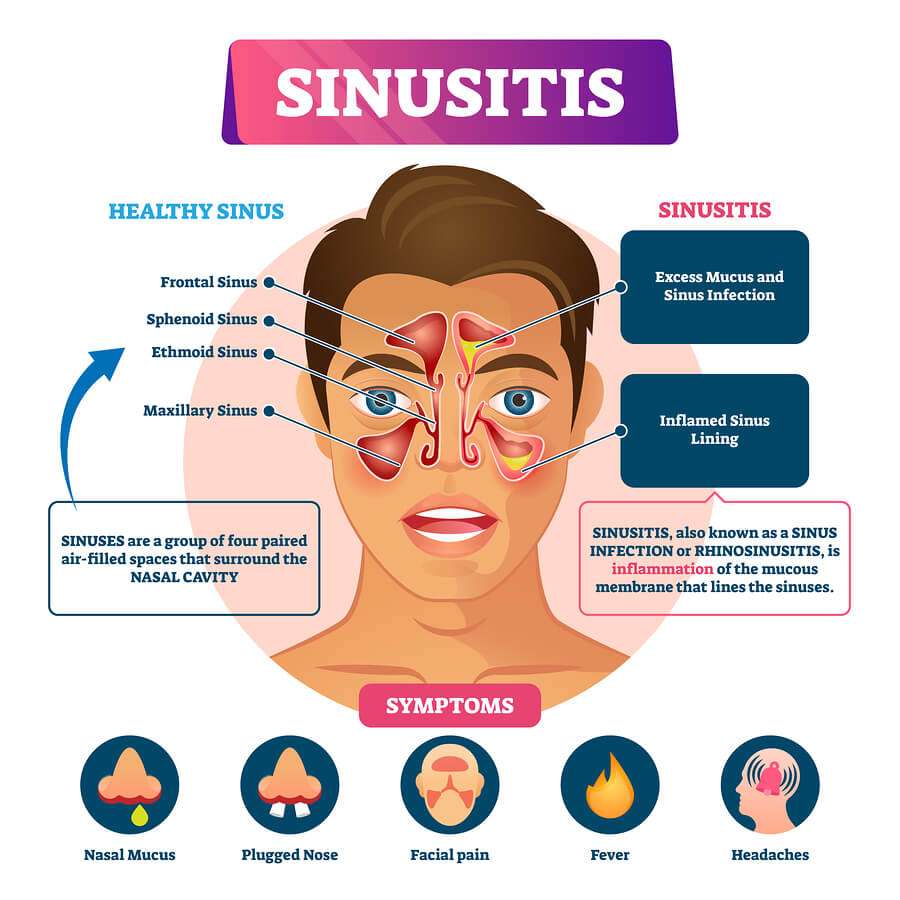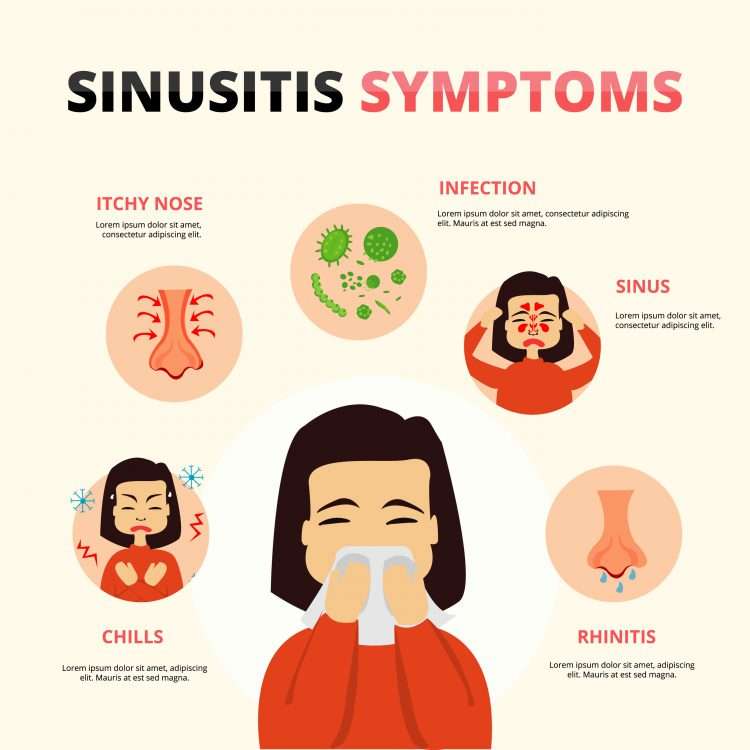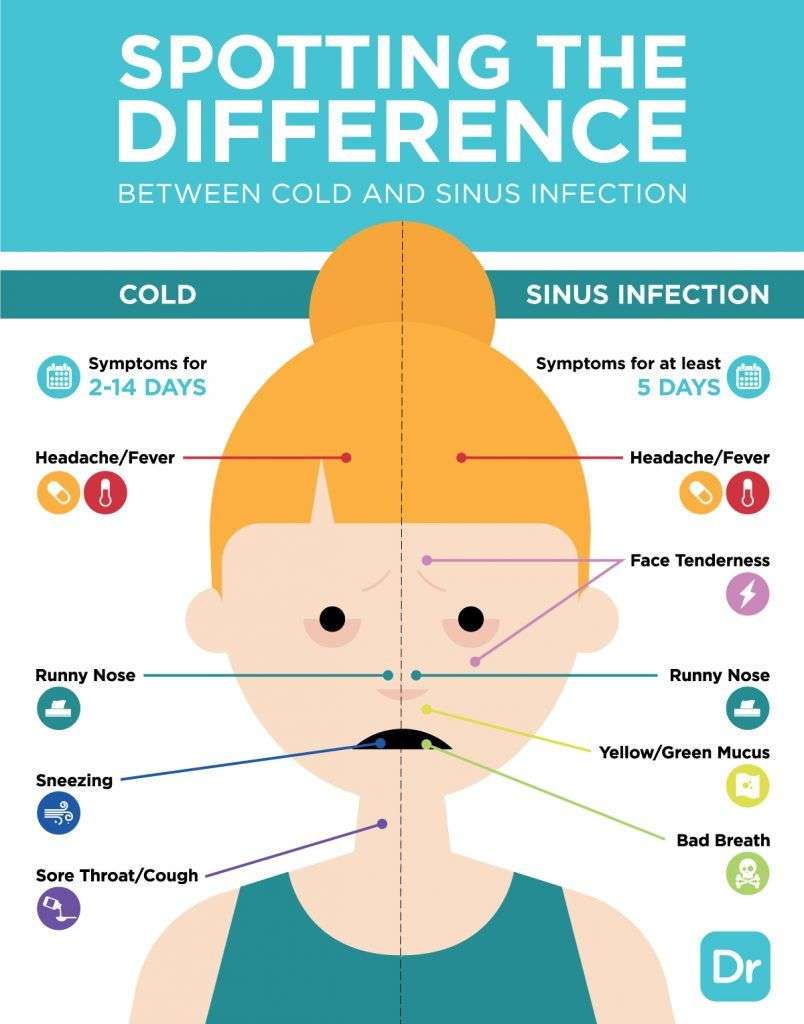When To Call Your Healthcare Provider
- Your symptoms are severe or they are getting worse after seven days.
- Your headache is severe and over-the-counter pain relievers don’t put a dent in it.
- You are running a fever of 100.4 degrees or more.
- You finished a course of prescribed antibiotics, but you still have symptoms.
If you have been having frequent bouts of sinusitis, you should see your healthcare provider to get a full diagnosis and check for problems that might be contributing to your episodes.
What Causes Sinus Infections And Sinusitis
Causes of Acute Sinus Infections
- Acute sinusitis usually follows a viral infection in the upper respiratory tract, but allergy-causing substances or pollutants may also trigger acute sinusitis. A Viral infection damages the cells of the sinus lining, leading to inflammation. The lining thickens, obstructing the nasal passage. This passage connects to the sinuses. The obstruction disrupts the process that removes bacteria normally present in the nasal passages, and the bacteria begin to multiply and invade the lining of the sinus. This causes the symptoms of sinus infection. Allergens and pollutants produce a similar effect.
- Bacteria that normally cause acute sinusitis are Streptococcus pneumoniae, Haemophilus influenzae, and Moraxella catarrhalis. These microorganisms, along with Staphylococcus aureus and some anaerobes , are involved in chronic sinusitis.
Causes of Chronic Sinus Infections
- Chronic sinus infections are caused by viruses, bacteria, allergens, pollutants, and fungal infections, especially people with diseases that weaken the immune system, for example, HIV/AIDS, leukemia and other cancers, and diabetes.
- Medications that are designed to modify the immune system may increase the risk of developing sinus infections.
- Ongoing bad breath unrelated to dental problems
People who have facial pain, headaches, and fever may indicate a sinus infection.
YOU MAY ALSO LIKE
Which Medications Open The Sinuses Will Antibiotics Cure Sinus Infections
Medications that Cure Sinus Infections
The goal in treating sinus infections is to eliminate bacteria from the sinus cavities with antibiotics. This helps prevent complications, relieve symptoms, and reduce the risk of chronic sinusitis.
- In acute, uncomplicated sinus infections, a synthetic penicillin, for example, amoxicillin , which is prescribed to most people to cure acute sinus infections. Amoxicilin is effective against the ususal causes of sinus infections, and is inexpensive. The most common side effects of amoxicillin include allergic reactions and an upset stomach.
- People allergic to penicillin can take a sulfur-containing antibiotic called trimethoprim/sulfamethoxazole or TMP/SMX . Sulfa drugs are not recommended for people who are allergic to sulfur.
- People who have several episodes, or partially treated acute sinusitis or those who have chronic sinusitis may become resistant to amoxicillin and TMP/SMX. Synthetic penicillins and cephalosporins such as amoxicillin/clavulanate , cefuroxime , and loracarbef can cure most sinus infections.
- Eventually, overuse of these “broad-spectrum” antibiotics may lead to organisms evolving that can resist even the most potent antibiotics available. Simpler antibiotics, for example, amoxicillin, should be used first and taken for the entire duration .
Medications to Keep the Sinuses Open
OTC Steroid Nasal Sprays
Nasal Sprays
Steroids are potent inhibitors of inflammation.
Don’t Miss: Is Zyrtec Good For Sinus Pressure
How To Prevent Sinus Infection From Spreading To The Brain
In order to prevent the infection from reaching the brain, follow the general guidelines of hygiene. Also, get in touch with an ENT doctor without any further delay. Some of the preventive measures to keep in mind are-
- Wash the hands with soap and water regularly.
- Do not touch the eyes, nose and mouth after sneezing
- Pay attention to the symptoms
- Avoid taking antibiotics regularly to prevent the bacteria from getting drug-resistant
Read more:
Sinusitis Vertigo And Dizziness A Complication Of Sinus Infection

Written byEmily LunardoPublished onNovember 3, 2015
Sinusitis vertigo and dizziness are complications of a sinus infection. Caused by bacteria, a virus, or fungus, sinusitis is inflammation of the sinuses. The sinuses are four hollow cavities in the human skull and are important parts of the immune system as they provide defense against infection. The sinuses are lined with mucous, which expels pollutants and bacteria from the body.
It is common for the infection that causes colds to also affect the sinuses and can contribute to dizziness. The dizziness is a result of fluid build-up in the ears that puts pressure on the eardrum and inner ear. This affects the vestibular labyrinth, which is intended to gauge balance, thus causing dizziness or vertigo. If dizziness is severe it can lead to nausea as well.
If a sinus infection leads to dizziness, it is due to a more serious bacterial infection, which requires treatment from a doctor. Dizziness is not a normal symptom of sinusitis and can lead to injury.
You May Like: What Is Good To Take For Sinus Pressure
Sinus Infection And Neck Pain: Is There A Correlation
People with allergies or chronic colds understand that sinus infections can be a real pain in the neck. Most cases of acute sinusitis get better on their own. Your doctor may recommend treatments to help relieve sinusitis symptoms, but acute sinusitis can cause potentially dangerous complications. Read on if youre wondering if sinus infections can cause neck pain.
What Is The Treatment For Sinus Infections And Sinusitis
- Systemic steroids
- A combination there several
What Are the Side Effects of Nasal and Oral Decongestants?
Both nasal and oral decongestants have side effects, which include:
- Increased heart rate
- Urinary problems, especially prostate disorders
Combining decongestants with OTC or prescribed medications with similar side effects may cause dangerous complications.
Don’t Miss: Best Medicine For Sinus Pressure And Congestion
How Long Do Sinus Headaches Last
Viruses cause most sinus infections. A viral sinus infection typically resolves on its own. Similar to how the common cold clears up by itself, your sinus headache should feel better within about a week. If it doesnt go away, see your healthcare provider. You may have a bacterial or fungal sinus infection that requires medication.
What Is A Sinus Headache
A formation of stress contained in the sinuses results in the situation of sinus headache. The build-up stress might be a results of irritation of sinuses. As a result of this irritation, the power of mucus to dry up decreases resulting in a headache and ache within the sinuses. A sinus headache might be due to an an infection or an allergic response.
The most typical indicators and signs of sinus headache are:
You May Like: Is Zinc Good For Sinus Infections
How Long Do Sinus Infections Or Sinusitis Last
Sinusitis or sinus infections usually clear up if treated early and appropriately. Aside from those who develop complications, the outlook for acute sinusitis is good. People may develop chronic sinusitis or have recurrent attacks of acute sinusitis if they have allergic or structural causes for their sinusitis.
How To Know If You Have A Sinus Headache
You can usually tell if you have a sinus headache based on your symptoms. If you have a sinus infection and a headache that started at about the same time, there is a good chance that its a sinus headache. And if you are evaluated by a healthcare provider, they will likely come to the same conclusion, based on the quality and timing of your symptoms.
If the cause of your symptoms is less clear, some other diagnostic tests may help:
-
A CT scan: This is a 3-dimensional X-ray of the head or face. It will not only show a sinus infection but can check for other causes of your headache as well, if the initial diagnosis is unclear.
-
Nasal endoscopy: This is a procedure performed by a healthcare provider , who uses a small camera to look into the sinuses. This inspection can show signs of infection and can also look for any structural problems, like nasal polyps, which could be causing the sinus infection in the first place.
You May Like: Best Medicine For Sinus Cold And Cough
What Is The Prognosis For A Sinus Headache
Sinus headaches are short-lived temporary problems associated with colds or hay fever. They recover quickly, once the underlying condition resolves.
Certain people develop chronic sinus inflammation and more long-standing symptoms associated with their sinusitis. Once the underlying condition is identified, preventive measures may be available and future recurrences of the sinus headache may be minimized. If the headache symptoms are not associated with inflammation of the sinuses, the underlying cause needs to be adequately addressed to relieve symptoms.
What Tests Diagnose Sinus Infections And Sinusitis

The diagnosis of a sinus infection is made based on a medical history assessment and a physical examination. Adequately distinguishing sinusitis from a simple upper respiratory infection or a common cold is important.
- Usually, sinusitis caused by bacteria will need antibiotic treatment to cure the infection.
- Upper respiratory tract infections and colds are viral illnesses so antibiotics have no benefit, and it may cause antibiotic resistance, which limits your body’s ability to cure future infections.
CT scan: In most cases, diagnosing acute sinusitis requires no testing. When testing is indicated, a CT scan will clearly depict all the paranasal sinuses, the nasal passages, and the surrounding structures. A CT scan may indicate a sinus infection if any of these conditions is present:
- Air-fluid levels in one or more sinuses
- Total blockage in one or more sinuses
- Thickening of the inner lining of the sinuses
- Mucosal thickening can occur in people without symptoms of sinusitis. CT scan findings must be correlated with a person’s symptoms and physical examination findings to diagnose a sinus infection.
Ultrasound: Another noninvasive diagnostic tool is ultrasound. The procedure is fast, reliable, and less expensive than a CT scan, although the results are not as detailed.
If your symptoms symptoms persist despite therapy, you may need a referral to an otolaryngologist or ENT . The doctor may:
Read Also: Relieve Sinus Pressure In Ears
Eye Signs And Symptoms
An infection in the sinuses can sometimes spread to the eye structures and cause a variety of signs and symptoms, depending on which tissues are involved. Profound swelling, typically affecting one eye, is a characteristic symptom. Eyelid swelling is often so severe that the affected eye can barely be opened. Other signs and symptoms that suggest eye-related complications of a sinus infection include:
- Swelling of the white portion of the eye
- Pus drainage from the involved eye
- Redness of the eye and/or eyelid
- Protrusion of the affected eyeball
- Pain with eye movement
- Inability to move the affected eyeball
- An infection in the sinuses can sometimes spread to the eye structures and cause a variety of signs and symptoms, depending on which tissues are involved.
What Prescription Medications Treat A Sinus Headache Pain And Pressure
Headaches from allergies can be relieved with a prescription for nasal steroids sprays unless there is a contraindication. This may be helpful along with nasal saline rinses to decrease inflammation within the nasal passages and treat or prevent sinusitis.
If a bacterial infection is suspected, the health-care professional may prescribe antibiotics to treat the infection and at the same time make suggestions to treat the underlying inflammation. To establish the diagnosis of acute bacterial rhinosinusitis and the need for antibiotics, your doctor should confirm that symptoms of acute rhinosinusitis have been present for 10 days or are worsening. Symptoms should include pus-like nasal drainage, nasal obstruction, facial pain, or pressure. If the inflammation does not resolve before the antibiotic course is complete, the bacterial infection may recur.
Also Check: The Best Sinus Infection Medicine
Ache Within The Higher Enamel
Higher rear enamel are near sinuses. This situation could make your higher enamel damage. Ache on this space is without doubt one of the most typical indicators of a sinus infection.
Should you really feel thrilling ache in your higher enamel, step one is to seek the advice of a dentist. Should you would not have any dental situations, the opposite purpose could be sinus.
Warning Signs And Symptoms Of A Dangerous Sinus Infection
Sinusitis describes inflammation of one or more of the paranasal sinuses, the air-filled spaces in the facial bones that open into the nasal cavity. This condition often occurs because of infection. Although infectious sinusitis is certainly uncomfortable, it usually does not pose a serious health threat. However, rare complications of infectious sinusitis can be dangerous and potentially life threatening if not diagnosed and treated promptly. These complications involve spread of the infection to the structures around the eye, the facial bones and/or the nervous system. Although rare, it’s important watch for warning signs and symptoms that might signal a potentially serious infectious sinusitis complication.
If you are experiencing serious medical symptoms, seek emergency treatment immediately.
Recommended Reading: Sinus Infection Loss Of Smell
What Are The Causes And Triggers Of Sinus Headaches
Sinus headaches are most often a symptom of sinusitis, in which the sinus becomes inflamed from allergies or other triggers like an infection. Sinus headaches may also result from seasonal allergies that last an extended period of time. This is called rhinitis, or hay fever. Sinus infections and sinus blockages can also trigger sinus headaches.
Can I Prevent Sinusitis
There is no sure-fire way to prevent sinusitis. But there are some things that might help.
- Dont smoke, and avoid other people’s smoke.
- Wash your hands often, especially during cold and flu season, and try not to touch your face.
- Stay away from things you know youre allergic to. Talk to your doctor to see if you need prescription medicines, allergy shots, or other forms of immunotherapy.
ishonestNo.161 – Uneven Skin Tone
If your sinus problems keep coming back, ask your doctor about the pros and cons of surgery to clean and drain the sinuses.
Recommended Reading: How To Cure A Sinus Infection Naturally
Chat With A Doctor And Get Sinus Infection Treatment For Just $23
Sinus inflammation has a lot of causes. Acute sinusitis due to a virus, which is typically called an upper respiratory infection or a common cold, comes on quickly and then gets better by 1-2 weeks. When the symptoms persist or worsen after one week, sometimes seeming to slightly get better before getting worse again, it may be a sign that a bacterial infection has set in. Very rarely, and usually in people with conditions that weaken the immune system, a fungal infection may cause sinusitis.
Many people suffer from chronic sinusitis, or chronic sinus inflammation, typically lasting at least three months. Chronic sinusitis is often caused by allergies, environmental irritants, or something that affects proper drainage of the sinus cavities.
- Headache that is throbbing in nature and only on one side of the head
Home Remedies To Treat Sinus Infection

There are at home remedies as well, which can ease a sinus infection and its corresponding symptoms. Home remedies for a sinus infection include:
- Taking a hot shower and inhaling steam through the nose
- Using a steam vaporizer
- Using topical medication with menthol on your chest
- Drinking plenty of fluids to thin out mucous
- Spicy foods to dissolve mucous
- Salt-water rinse through the nasal cavity
- Putting apple cider vinegar in hot water and drinking it like a tea
- Avoiding alcohol, smoke or dry air
These home remedies are effective ways to get your breathing healthy once again, along with reducing headaches, pressure and ridding yourself of mucous.
Emily Lunardo studied medical sociology at York University with a strong focus on the social determinants of health and mental illness. She is a registered Zumba instructor, as well as a Canfit Pro trainer, who teaches fitness classes on a weekly basis. Emily practices healthy habits in her own life as well as helps others with their own personal health goals. Emily joined Bel Marra Health as a health writer in 2013.
You May Like: Sinus Infection Vs Flu Vs Cold
Chronic Sinus Headache Symptoms
The symptoms of different kinds of headaches may overlap a lot, but the causes can be very different. If you’ve been having frequent pain in your head and face, you may be surprised to learn that the issue may be your sinuses. Figuring out the source of your pain can help you find lasting relief from your sinus headache.
Runny Nose And Postnasal Drip
When you have a sinus infection, you may need to blow your nose often because of nasal discharge, which can be cloudy, green, or yellow. This discharge comes from your infected sinuses and drains into your nasal passages.
The discharge may also bypass your nose and drain down the back of your throat. You may feel a tickle, an itch, or even a sore throat.
This is called postnasal drip, and it may cause you to cough at night when youre lying down to sleep, and in the morning after getting up. It may also cause your voice to sound hoarse.
Recommended Reading: What Is The Best Nighttime Sinus Medicine